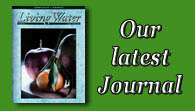“Whoever believes in Me, as the Scripture has said, streams of living water will flow from within him.” — John 7:38
“Do not think that I have come to abolish the Law or the Prophets; I have not come to abolish them but to fulfill them.” — Matthew 5:17
In most European languages, the name for Resurrection Sunday is derived from the Hebrew word for Passover, “Pesach.” The week of Passover originally contained three main events or feasts: the Feast of Passover, the Feast of the Unleavened Bread, and the Feast of the Firstfruits. Let us look briefly at our true foundation for this blessed time of celebration.
The Passover meal or “Seder” is eaten on the eve of the first day of the Passover. It is this meal Jesus ate with His disciples that we as Christians now refer to as the Last Supper. As a part of this celebration, the Pascal lamb is slain, in remembrance of when the children of Israel had to mark the door posts and lintels of their homes so that the angel of death would pass over their homes, that they might be delivered from death and set free from their bondage. This was a foreshadowing of Jesus, the Lamb of God, whose blood would be shed to bring us salvation — setting us free from the power of sin, death, and the grave. Though once captives to sins, we have now been set free from its bondage.
During the Feast of Unleavened Bread, the Jewish people refrain from eating food with leavening in remembrance of their being confined to such bread, of necessity, for many days after they came out of Egypt. “For seven days no yeast [leavening] is to be found in your houses” (Exodus 12:19). The Jewish people not only refrain from eating food with leavening, they purge all traces of it from their houses. In the Bible, leaven represents evil and wickedness, and we are instructed to “Purge out the old leaven, that you might be a new lump, as you are unleavened. For even Christ our Passover is sacrificed for us: Therefore let us keep the feast, not with old leaven, neither with the leaven of malice and wickedness; but with the unleavened bread of sincerity and truth” (1 Corinthians 5:7–8). The Feast of the unleavened Bread shows us the pathway of sanctification (purification) that we are on as believers. We are not only to put off the old corrupt
man, we are to “... put on the new man which was created according to God, in true righteousness and holiness” (Ephesians 4:24). We not only leave behind our bondage, but we prepare ourselves to be the bride of the Lamb — without spot or wrinkle.
In the Feast of the Firstfruits, the first barley plants are harvested, prepared as flour, and presented to the priests. Through this, Israel acknowledged their total dependence on God for their provision, that the entire harvest belonged to the Lord, and that they trusted in Him to bring it forth in its proper season.
For the Christian, the Feast of Firstfruits pictures the resurrection of Christ, and points forward to that day when, in the fulness of time, we shall be resurrected. Indeed, the resurrection occurred on the Feast of Firstfruits (the Sunday after Passover). The Scriptures tell us that Jesus fulfilled this symbolic prophecy of the Messiah by being the first of all who will be raised from the dead on the last day. “But now Christ is risen from the dead, and has become the firstfruits of those who have fallen asleep. For since by man came death, by Man also came the resurrection of the dead. For as in Adam all die, even so in Christ all shall be made alive. But each one in his own order: Christ the firstfruits, afterward those who are Christ’s at His coming” (1 Corinthians 15:20–23).
The three spring feasts reflect the Christian walk. Our salvation is assured through the shed blood of Christ (Passover). We then walk in communion with Him coming into His holiness (Unleavened Bread). And we have the blessed promise that someday we will be resurrected to walk with the Lord forever (Firstfruits).
Let us celebrate, as Jesus did, the radiant reality of all three festivals. Jesus observed His final Passover by eating the Seder with His disciples. His body was broken for us as He consecrated the Feast of Unleavened Bread, that we might be new, unleavened bread. He celebrated the Feast of the Firstfruits by rising from the dead! And so every resurrection Sunday — every Feast of Firstfruits — we can confidently proclaim, “The Lord is risen ... He is risen indeed."
All contents of this website are protected under copyright. Living Water Ministry © 2020 All rights reserved.
www.livingwaterministry.net



